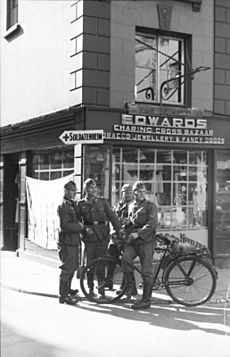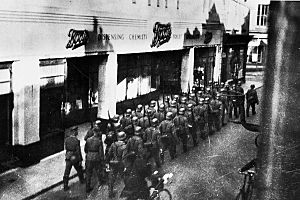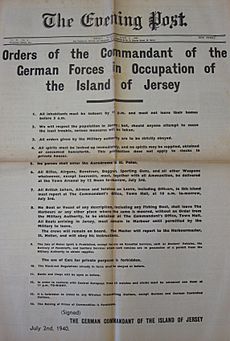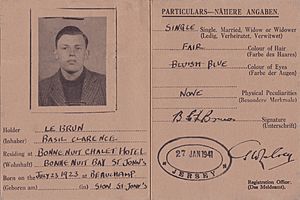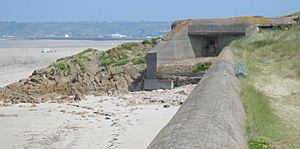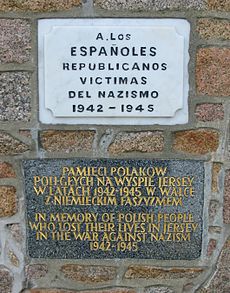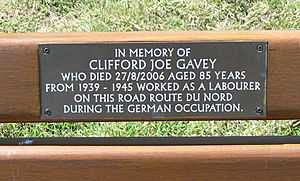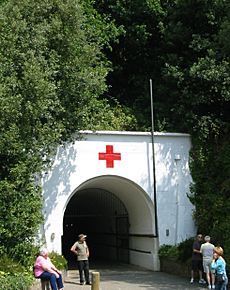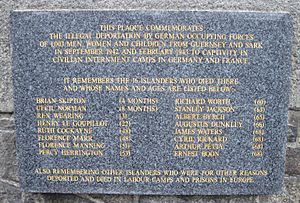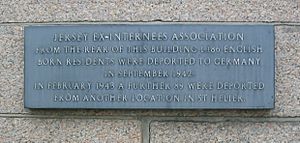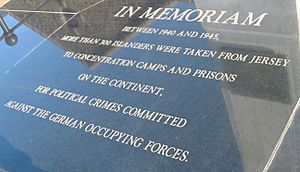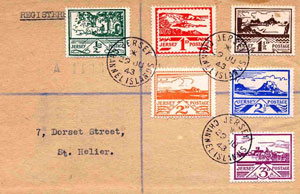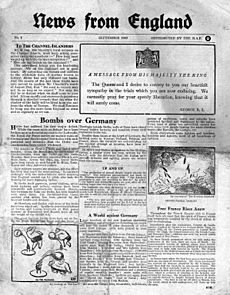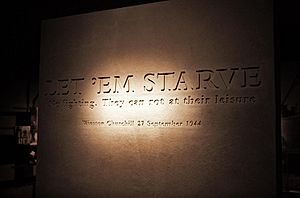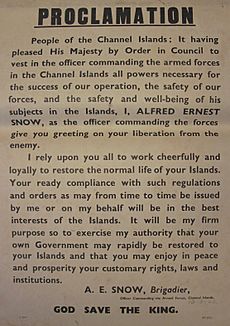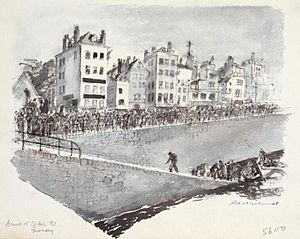German occupation of the Channel Islands facts for kids
The Channel Islands, like Jersey and Guernsey, are small islands in the English Channel, close to France. They are part of the British Crown, but during most of World War II, from June 30, 1940, to May 9, 1945, they were taken over by Nazi Germany. These islands were the only part of the British Empire that Germany occupied during the war.
At first, the German soldiers tried to be fair to the people living there, hoping to win them over. But as the war went on, things got much harder. By the winter of 1944-45, both the islanders and the German soldiers were almost starving. There wasn't much armed resistance from the islanders. Many people worked for the Germans, and Germany brought thousands of forced workers to build strong defenses on the islands. Even though the Germans were in charge, the island leaders managed to keep some control and make some decisions for their people.
Contents
Life Before the Occupation
The Start of World War II
When the United Kingdom declared war on Germany on September 3, 1939, not much changed in the Channel Islands at first. Unlike in the UK, people didn't have to join the army, but some went to Britain to volunteer. Farming and tourism continued as usual.
However, on May 10, 1940, Germany attacked the Netherlands, Belgium, and Luxembourg. The war got much closer. On June 11, 1940, British planes even flew from small airfields in Jersey and Guernsey to bomb cities in Italy.
Islands Become Demilitarized
On June 15, 1940, after the Allies lost the Battle of France, the British government decided that the Channel Islands were not important for fighting the war. They would not be defended. The British didn't tell Germany this. So, the Channel Islands, the oldest possessions of the British Crown, were given up without a fight. The islands were declared an "open town," meaning they had no military defenses.
On June 16, 1940, the leaders of Jersey and Guernsey were asked to send as many boats as possible to help British soldiers escape from Saint-Malo in France. Jersey boats helped evacuate troops on June 17 and 18. On June 17, General Charles de Gaulle, a French leader, even stopped in Jersey on his way to London. The last British troops left the islands on June 20, 1940.
Evacuating Civilians
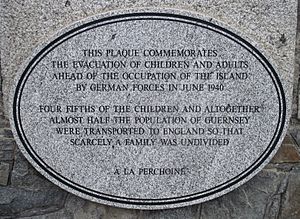
The decision to evacuate civilians from the Channel Islands came very late. There was no clear plan, and communication was confusing. Different islands made different choices. The British government decided to send as many ships as possible so islanders could leave if they wanted to.
Almost everyone in Alderney left. The leader of Sark, Sibyl Hathaway, told everyone to stay. In Guernsey, 80% of school children left, along with 12,000 adults out of 42,000 people. In Jersey, 23,000 people signed up to leave, but most decided to stay. Only 6,600 out of 50,000 left. The last official evacuation boats left on June 23, 1940.
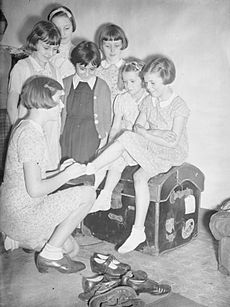
Many evacuated children were separated from their parents. Some were helped by a program where wealthy Americans sponsored them. Even the US First Lady, Eleanor Roosevelt, sponsored a girl named Paulette.
Emergency Government
The British government told the island leaders, called Bailiffs, to take over running the islands if the British representatives left. The Bailiffs and other officials were told to stay in their jobs, even under German rule.
Special arrangements were made so that British laws could still work during the occupation. The Bailiffs took over the civilian duties of the British governors. To make quick decisions, smaller government groups were formed that could meet in private.
In Guernsey, a "controlling committee" was set up on June 21, 1940, led by Ambrose Sherwill. In Jersey, a "Superior Council" was formed on June 27, 1940, led by Bailiff Alexander Coutanche.
German Invasion
The Germans didn't know the islands had no defenses. On June 28, 1940, German bombers attacked the harbors of Guernsey and Jersey. They thought trucks waiting to load tomatoes were troop carriers. In total, 44 islanders were killed in these attacks. The BBC then announced that the islands were "open towns."
On June 30, a German pilot landed at Guernsey's empty airfield and reported that the islands were not defended. German airmen were flown to Guernsey that evening. A police inspector met them with a letter from the Bailiff, stating the island was undefended. The German officer announced that Guernsey was now under German control. Jersey surrendered on July 1, Alderney on July 2, and Sark on July 4.
What Happened During the Occupation?
German Control
The German forces quickly took control. They brought in soldiers, set up communication systems, and built anti-aircraft defenses. They also started an air service with France.
The Germans made changes to daily life. They changed the time zone to Central European Time, like most of Europe. They also made everyone drive on the right side of the road. Special money, called scrip, was printed to keep the economy going. German soldiers used this money, and islanders working for the Germans were also paid in it.
The Germans allowed entertainment like cinemas and theaters to continue. Their military bands even played music in public.
Working with the Germans
Most islanders felt that actively fighting the Germans would be too dangerous and would only lead to problems for civilians. They wanted to cooperate enough to keep things running but not truly help the Germans.
The island governments tried to work with the Germans while keeping as much independence as possible. This was a difficult balance. Some islanders later debated whether their leaders had cooperated too much. However, many historians say the island leaders did their best to protect their people.
Norman Le Brocq, a leader of the Jersey resistance, felt that some island police and government officials had cooperated too much, especially by giving information about Jewish residents to the Nazis.
Daily Life for Civilians
Life under occupation was a big shock. Having their own governments still in place helped keep some distance from the German soldiers. Many people lost their jobs as businesses closed. As the war went on, life got much harder. Morale dropped, especially when radios were taken away and people were deported in 1942. Food, fuel, and medicines became very scarce, and crime increased. The winter of 1944-45 was very cold and hungry. Many people were saved from starvation by food parcels from the Red Cross.
New Rules and Restrictions
When the Germans arrived, they immediately put new laws in place. More rules were added over time. These rules included:
- Taking things away: Weapons, boats, radios, cars, cameras, and fuel were confiscated. German soldiers also took over houses and furniture.
- Limiting activities: Fishing, drinking alcohol, exporting goods, and changing prices were restricted. Patriotic songs and signs were banned. More than three people couldn't meet together. Access to beaches, fuel, medicines, and some clubs was limited. Freedom of speech was also restricted.
- Changes: Clocks were changed to German time. Driving was switched to the right side of the road. Food rations were introduced and changed often.
- Forced to accept: Islanders had to deal with censorship, curfews, a new exchange rate for German money, and a census. They were told to grow vegetables and accept food rationing. Income tax increased. Identity cards became mandatory. Cycling in single file was required. People had to take in German soldiers as lodgers. German language was taught in schools, and islanders were forced to work for the Germans.
Building Fortifications
As part of their "Atlantic Wall" defense, the Germans built many strong fortifications, roads, and other structures on the Channel Islands between 1940 and 1945. Hitler ordered these islands to be turned into an "unbreakable fortress." A huge amount of steel and concrete was used. The islands became some of the most heavily fortified places in the Atlantic Wall.
Much of this work was done by forced labor. The Germans brought over 16,000 slave workers to the islands. These workers came from many places, including the Soviet Union, France, Belgium, the Netherlands, North Africa, and Spain.
Islanders were also asked to work for the Germans. At first, they refused to work on military projects, saying it was against international rules. But the Germans threatened to force them or send them to France. Many islanders took jobs with the Germans because they needed money.
Some British people who were conscientious objectors (people who refused to fight in the war) and Irish citizens also worked for the Germans. The Germans tried to turn the Irish workers against Britain.
Light railways were built in Jersey and Guernsey to move supplies to the coastal defenses. The Alderney Railway was also taken over by the Germans.
Forced Labor Camps
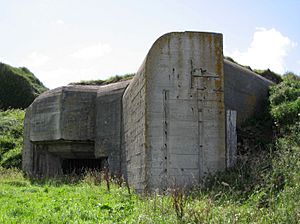
The Germans built many camps on Jersey, Guernsey, and four main camps on Alderney. These camps were run by a Nazi organization called Organisation Todt. They used both volunteers and forced laborers to build bunkers and other defenses.
On Alderney, the camps started in January 1942 and held about 6,000 prisoners. Two camps, Borkum and Helgoland, were for "volunteer" workers who were paid. The other two, Sylt and Norderney, were forced labor camps. Sylt camp held Jewish forced laborers, and Norderney held European and Soviet forced laborers. In March 1943, these two camps became concentration camps.
More than 700 prisoners died in Alderney or on ships traveling to and from the island. In Jersey, there were also camps, like Lager Wick, which housed about 200 workers.
Norman Le Brocq's resistance group tried to help the prisoners. They made posters and leaflets in Spanish and Russian to tell the forced laborers about German defeats in Russia.
Jewish People
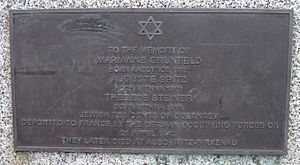
A small number of Jewish people lived on the Channel Islands during the occupation. Most had left in 1940. The Germans ordered the police to identify Jewish residents. Island authorities followed these orders, marking registration cards with a red "J" and listing Jewish property.
Jewish residents faced many restrictions, including closing their businesses, giving up their radios, and having limited time outside. Local officials tried to help by refusing to make Jews wear yellow stars and by creating false documents for some. However, three Jewish women from Austria and Poland, Therese Steiner, Auguste Spitz, and Marianne Grünfeld, were deported to France in April 1942 and later sent to Auschwitz, where they died.
Freemasons and Other Groups
Freemasonry, a social organization, was banned by the Germans. Their meeting places were searched, and items were taken to Berlin. The island governments tried to protect Masonic property. No individual Freemason was punished just for being a member. Scouting was also banned but continued secretly, as did the Salvation Army.
Deportations
In 1942, Adolf Hitler ordered that all Channel Island residents who were not born on the islands, and men who had been officers in World War I, be sent away. Most were sent to camps in Germany. This order was a punishment for Britain sending German civilians from Iran to camps. About 2,300 people were deported, and 45 of them died before the war ended.
Imprisonment and Deaths
Many islanders were arrested for breaking German laws or for acts of defiance. Some were sent to Nazi prisons and concentration camps, where many died. In Jersey, 22 islanders died in these camps, and in Guernsey, 9 died. These individuals are remembered on Holocaust Memorial Day.
Resistance Efforts
One of the first resistance groups was the Jersey Communist Party, started by a teenager named Norman Le Brocq. He helped create a larger group called the Jersey Democratic Movement to unite different resistance efforts.
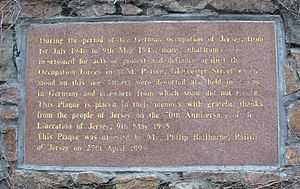
About 4,000 islanders were punished for breaking laws, though many were for regular crimes, not resistance. About 570 prisoners were sent to prisons and camps in Europe.
No islanders joined the German military. However, Eddie Chapman, an Englishman in prison in Jersey, offered to spy for the Germans. He later became a double agent for the British.
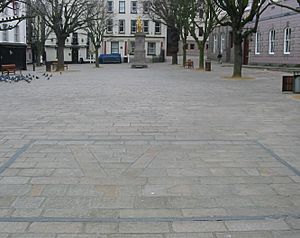
Resistance included quiet acts of defiance, small acts of damage, hiding and helping escaped forced workers, and secretly sharing news from BBC radio. There was no armed resistance movement. Many islanders showed their support for Britain by painting "V" for Victory signs.
Two things especially angered islanders: when their radios were taken away and when people were deported.
In May 1942, three young people tried to escape from Jersey by boat. One drowned, and the others were imprisoned in Germany. After this, rules on small boats and cameras became stricter, and all radios were taken from the public. About 225 islanders managed to escape to England or France.
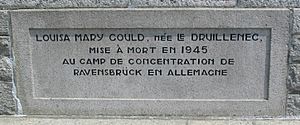
Louisa Gould hid a wireless set and sheltered an escaped Soviet prisoner. Betrayed by an informer at the end of 1943, she was arrested and sentenced on 22 June 1944. In August 1944 she was transported to Ravensbrück where she died on 13 February 1945. In 2010 she was posthumously awarded the honour British Hero of the Holocaust.
Listening to the BBC was banned, but many islanders secretly kept their radios or made new ones. German raids to find radios made the people even more angry.
A shortage of coins in Jersey led to new banknotes being printed. An artist named Edmund Blampied designed a 6 pence note with a hidden "V" for victory sign. He also designed stamps with the initials "GR" (for King George VI) to show loyalty to Britain.
The deportations in 1942 caused the first large protests against the occupation. This unfair act made many islanders quietly support resistance activities. Seeing the brutal treatment of forced laborers made many islanders realize the true cruelty of the Nazi regime. The forced marches and public beatings showed the harsh reality behind the Germans' polite front.
British Government's Actions
The British government's reaction to the invasion was quiet. British planes sometimes dropped propaganda newspapers and leaflets on the islands.
Raids on the Islands
British commandos carried out several small raids on the Channel Islands.
- In July 1940, a Guernseyman named Hubert Nicolle went on a secret mission to Guernsey but was captured.
- On July 14, 1940, Operation Ambassador failed to make contact with German soldiers.
- Operation Dryad in September 1942 successfully raided the Casquets lighthouse.
- Operation Basalt in October 1942 on Sark resulted in three German soldiers killed and one captured. This led to a German order to execute captured commandos.
- Other raids, like Operation Huckaback and Pussyfoot on Herm, and Hardtack on Jersey and Sark, had mixed results, with some commandos being killed or wounded by mines.
In 1943, Lord Mountbatten suggested a plan called Operation Constellation to retake the islands, but it was never carried out.
Bombing and Ship Attacks
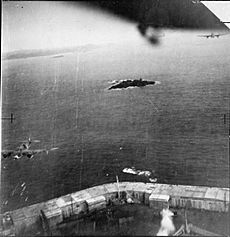
The British Royal Air Force (RAF) bombed the Channel Islands 22 times during the war. These attacks killed 93 people and injured 250, many of whom were forced laborers.
In June 1944, a German artillery battery in Alderney fired on American troops in France. A British warship, HMS Rodney, fired back, damaging two German guns.
Islanders in London
Since the Channel Islands had no elected representatives in the British Parliament, islanders living in the UK worked to make sure their home islands were not forgotten. Groups like the Jersey Society in London and the Guernsey Society helped evacuees and planned for the islands' future after the war. Lord Portsea, a Jerseyman who was a member of the British Parliament, spoke up for the islanders and urged the British government to help them.
Under Siege
In June 1944, the Allies landed in Normandy, France, to free Europe. They decided to skip the Channel Islands because they were so heavily fortified. This cut off the German supply lines to the islands. Food and other supplies became extremely scarce, and both islanders and German soldiers faced starvation.
In August 1944, Germany offered to let all Channel Island civilians, except military-aged men, leave through the Red Cross. The British government, including Winston Churchill, considered the offer but rejected it.
It took months of talks before the Red Cross ship SS Vega was allowed to bring food, soap, and medical supplies to the starving islanders in December 1944. The Vega made five more trips, even after the islands were freed.
Liberation Day
Freedom Arrives
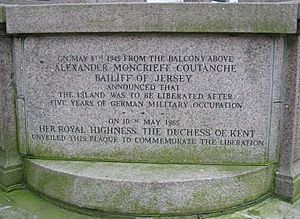
The Channel Islands were freed after Germany surrendered in World War II. On May 8, 1945, at 10:00 AM, the German authorities told the islanders that the war was over.
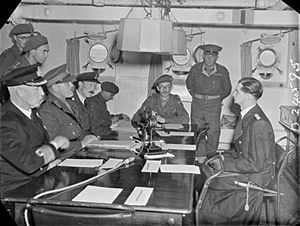
The next morning, May 9, 1945, the British ship HMS Bulldog arrived in St Peter Port, Guernsey. The German forces surrendered without a fight. British soldiers landed shortly after.
Another British ship, HMS Beagle, did the same for Jersey. Two naval officers were met by the harbor master, and they raised the British flag over his office and the Pomme D'Or Hotel.
Sark was freed on May 10, 1945, and the German troops in Alderney surrendered on May 16, 1945. The German prisoners were removed from Alderney by May 20, and islanders began returning in December 1945 after the Germans helped clean up.
After the War
The main British forces arrived on May 12, 1945. The British government had prepared to help the islands. Food, clothing, and household items were ready. German money was kept in use for a while before being changed back to British currency.
The British Home Secretary visited the islands in May and explained why they had not been defended in 1940 or freed by force after D-Day. On June 7, the King and Queen visited Jersey and Guernsey to welcome them "back to freedom."
After the liberation, there were investigations into people who were accused of helping the Germans. Most accusations were found to be untrue. Only a few cases were considered for prosecution.
Women who had relationships with German soldiers were sometimes treated badly by other islanders after the liberation. British soldiers had to step in to stop revenge attacks.
Alderney was run as a communal farm for two years after the war to help rebuild it. The islanders eventually gained more control over their land and government.
The occupation changed the islands' culture, especially in Guernsey. Many children who had been evacuated lost their ability to speak the local dialect.
The abandoned German forts and tunnels were dangerous, and there were many accidents. Many bunkers and tunnels can still be seen today. Some have been turned into museums.
The islands were deeply in debt after the war. The British government gave them £3.3 million to help pay for damages and losses.
Lasting Impact
- Liberation Day: Jersey and Guernsey celebrate Liberation Day on May 9 as a national holiday. Sark celebrates on May 10. Alderney celebrates "Homecoming Day" on December 15, when the first evacuated residents returned.
- Historical Preservation: The Channel Islands Occupation Society works to study and preserve the history of this time.
- Museums and Memorials: Some German fortifications have been turned into museums, like the Underground Hospitals in Jersey and Guernsey. Liberation Square in Jersey has a sculpture celebrating freedom. Guernsey has a sundial monument that tells the story of liberation.
- Special Coins: Jersey produced a penny coin inscribed "Liberated 1945."
- Memorials: A memorial stone was unveiled at Noirmont in Jersey in 1970 to remember those who died.
- Town Twinning: Saint Helier, Jersey, is twinned with Bad Wurzach in Germany, where deported islanders were held.
- Recognition: In 1966, Norman Le Brocq and 19 other islanders received gold watches from the Soviet Union for their resistance efforts. In 2010, four Jerseymen were posthumously awarded the "British Hero of the Holocaust" honor for helping Jewish victims.
Social Impact
Children Born During the Occupation
Many children were born to German fathers during the occupation. Records show an increase in births during this time. Some estimates suggest hundreds of such babies were born in Jersey alone. These children were often raised by other families or adopted. Some were placed in orphanages.
In Media
The occupation has been featured in many forms of media:
- Music: The Liberation Jersey International Music Festival remembers the occupation. Composer John Ireland's Fantasy-Sonata was inspired by his evacuation. Singer-songwriter Gwyneth Herbert's song "Alderney" tells the story of the island's evacuation.
- Video Games: Occupied Guernsey appears in the game Sniper Elite 5.
- Television and Film: Many documentaries, TV shows, and films have been made about the occupation, including Appointment with Venus, Triple Cross, Enemy at the Door, The Others, Island at War, Another Mother's Son, and The Guernsey Literary and Potato Peel Pie Society.
- Plays: Stage plays like Dame of Sark and Lotty's War are set during the occupation.
- Novels: Many novels have been set in the occupied islands, including Appointment with Venus, A Game for Heroes, The Book of Ebenezer Le Page, and The Guernsey Literary and Potato Peel Pie Society.
Images for kids
-
An inscription, reading "Liberated" in Jèrriais, was installed at La Pièche dé l'Av'nîn in St. Helier to mark the 60th anniversary of the Liberation in 2005
-
An underground command bunker, built at La Hougue Bie in Jersey, now houses an exhibition commemorating the workers from across Europe forced to build defenses during the occupation
-
Plaque at Gorey: "Captain Ed Clark, Lieutenant George Haas: On 8 January 1945 these two American officers escaped from their prisoner of war camp in St. Helier. Assisted by local residents and in particular Deputy W.J. Bertram BEM, of East Lynne, Fauvic, they successfully avoided recapture by the German forces. On the night of 19 January 1945 they removed a small boat from this harbour and 15 hours later after an arduous crossing in bad weather, landed near Carteret on the French Cotentin Peninsula. This tablet was unveiled on the 50th anniversary of this event on 20 January 1995 by Sir Peter Crill KBE, Bailiff of Jersey."
See also
- Aviation accidents and incidents in the Channel Islands in the 1940s
- William John Corbet, escaper
- German Fortifications in Jersey
- Fort Hommet 10.5 cm Coastal Defence Gun Casement Bunker
- Henri Gonay, Belgian airman killed in Jersey, 1944
- Military history of France during World War II
- Neuengamme concentration camp subcamp list
- Sark during the German occupation of the Channel Islands
- Walker Collection: A collection of philatelic material in the British Library relating to the occupation.
 | Anna J. Cooper |
 | Mary McLeod Bethune |
 | Lillie Mae Bradford |


